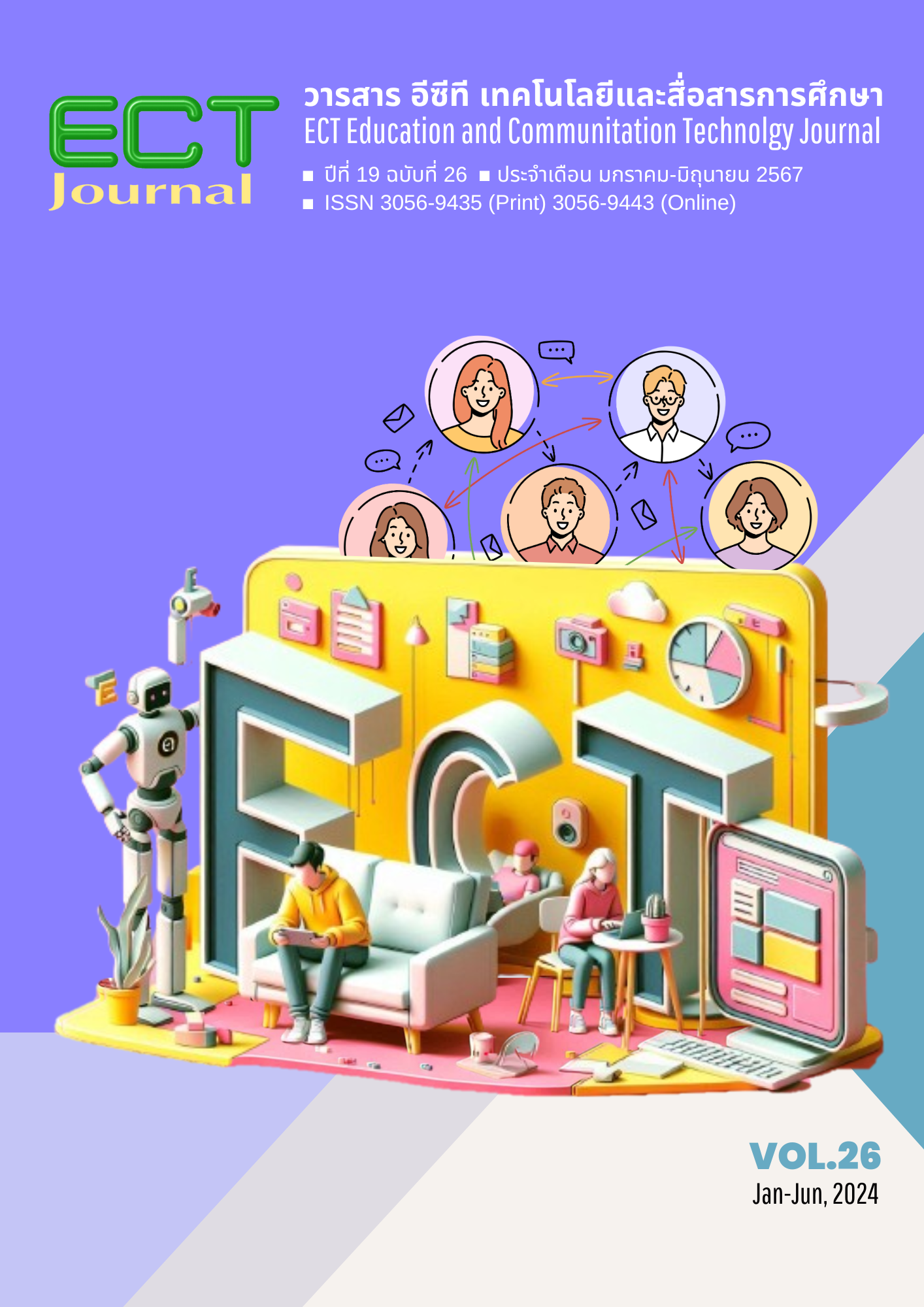Developing of an Online Microlearning Training System to Enhance the Basic Computer Knowledge of Teachers at Mater Dei Institute
Keywords:
Microlearning, Online Training, Basic ComputerAbstract
The objectives of this research were 1) to develop an online microlearning training system for basic computer knowledge, 2) to compare basic computer knowledge before and after using the microlearning online training system through the comparison between before and after using online microlearning training system. The sampling group consisted of 42 teachers from Mater Dei institute using volunteer sampling: They self-registered via an internet form. The research instruments were a Basic computer skills assessment questionnaire and post-learning assessment test. The statistic used in this study were percentages, means, standard deviations, t-test dependent, and hypothesis testing between the two related sample groups.
The study revealed that 1) the online microlearning training system for fundamental computer knowledge was developed at a high level that the score was 4.60 from expert evaluations. It indicates that the training method and media were of excellent quality and it could be used. However, improved parts can lead to higher quality. As a result, the training system has been designed to a high standard and is suitable for conducting research. 2) the test showed significant improvement in learning outcomes after training, with pre-training scores (M = 7.66, SD = 1.65) increasing to post-training scores (M = 11.74, SD = 1.38), a significance difference at the .01 level.
References
กระทรวงศึกษาธิการ. (2563). แผนปฏิบัติการดิจิทัลเพื่อการศึกษา กระทรวงศึกษาธิการ พ.ศ. 2563-2565. https://bict.moe.go.th/wp-content/uploads/2022/03/digital-63-65.pdf
ชัยศาสตร์ คเชนทร์สุวรรณ. (2563). การพัฒนาผลสัมฤทธิ์ทางการเรียน เรื่อง พันธุกรรม ด้วยไมโครเลิร์นนิง สำหรับนักเรียนระดับชั้นมัธยมศึกษาปีที่ 3. วารสารวิจัยและพัฒนา มหาวิทยาลัยราชภัฏสวนสุนันทา, 12(2), 137-147. https://doi.org/10.53848/irdssru.v12i2.242463
ณัฐกร สงคราม. (2554). การออกแบบและพัฒนามัลติมีเดียเพื่อการเรียนรู้ (พิมพ์ครั้งที่ 2). สำนักพิมพ์แห่งจุฬาลงกรณ์มหาวิทยาลัย.
ณัฐญา ห่านรัตนสกุล. (2561). ความเข้าใจในเนื้อหาภาษาที่สองผ่านสื่อการเรียนรู้มัลติมีเดีย: กรณีศึกษา Redundancy Principle และ Modality Principle ในสื่อมัลติมีเดียภาษาญี่ปุ่น [วิทยานิพนธ์ปริญญามหาบัณฑิต ไม่ได้ตีพิมพ์]. สถาบันบัณฑิตพัฒนบริหารศาสตร์.
ธนพงษ์ คุณชัยเกษม และคณะ. (2564). การพัฒนาระบบการฝึกอบรมออนไลน์แบบไมโครเลิร์นนิ่งเพื่อพัฒนาความรู้พื้นฐานทางคอมพิวเตอร์ของครูโรงเรียนมาแตร์เดอีวิทยาลัย [วิทยานิพนธ์ปริญญามหาบัณฑิต ไม่ได้ตีพิมพ์]. มหาวิทยาลัยเกษตรศาสตร์.
ธีรวัฒน์ กัดมั่น และภาสกร เรืองรอง. (2564). การพัฒนาบทเรียนคอมพิวเตอร์ช่วยสอน ตามรูปแบบแนวคิดของกาเย่ รายวิชาวิทยาการคำนวณ สำหรับนักเรียนชั้นมัธยมศึกษาปีที่ 1 โรงเรียนบางระกำวิทยศึกษา. วารสารวิชาการการจัดการเทคโนโลยี มหาวิทยาลัยราชภัฏมหาสารคาม, 8(1), 33-45. https://ph02.tci-thaijo.org/index.php/itm-journal/article/view/242538
นาปีซะห์ ดือราแม, จิระวัฒน์ ตันสกุล, มัฮดี แวดราแม, สล้าง มุสิกสุวรรณ และเกรียงศักดิ์ ดำชุม. (2564). การพัฒนาโปรแกรมการทดสอบแบบปรับเหมาะด้วยคอมพิวเตอร์ สําหรับสมรรถนะครูด้านการวิจัยเพื่อพัฒนาการเรียนรู้. วารสารศึกษาศาสตร์ มหาวิทยาลัยสงขลานครินทร์ วิทยาเขตปัตตานี, 33(3), 214-225. https://so02.tci-thaijo.org/index.php/edupsu/article/view/247923
โรงเรียนมาแตร์เดอีวิทยาลัย. (2565). แผนพัฒนาการจัดการศึกษา 2561-2565 โรงเรียนมาแตร์เดอีวิทยาลัย. https://www.materdei.ac.th/about-develop
โรงเรียนมาแตร์เดอีวิทยาลัย. (2563). รายงานผลการประเมินตนเองของสถานศึกษา (Self - Assessment Report: SAR) ปีการศึกษา 2563. https://www.materdei.ac.th/article/48
วิชัย วงษ์ใหญ่ และมารุต พัฒผล. (2564). การเรียนรู้ปรับได้. http://www.curriculumandlearning.com/upload/Books/Adaptive%20Learning_1616200602.pdf
ศยามน อินสะอาด. (2564). การออกแบบไมโครเลิร์นนิงยุคดิจิทัล. วารสารเทคโนโลยีและสื่อสารการศึกษา, 16(20), 16-27. https://so01.tci-thaijo.org/index.php/ectstou/article/view/246033
สำนักงานคณะกรรมการข้าราชการพลเรือน. (2561). รายงานผลการดำเนินงานประจำปี พ.ศ. 2561. https://www.ocsc.go.th/download/2562/
สิริพร อัถประเสริฐกุล. (2563). การพัฒนาระบบ E-Training เรื่องกฎระเบียบและสวัสดิการสำหรับพนักงาน บริษัท ซันนี่เวิลด์ เคมีเคิล จำกัด [การศึกษาค้นคว้าอิสระปริญญามหาบัณฑิต ไม่ได้ตีพิมพ์]. มหาวิทยาลัยเกษตรศาสตร์.
สุรัมภา เพ็ชรขำ และทนงศักดิ์ โสวจัสสตากุล. (2565). การพัฒนาสื่อมัลติมีเดียด้วยวิธีการเรียนรู้ด้วยตนเองสำหรับนักเรียนระดับชั้นประกาศนียบัตรวิชาชีพ ชั้นปีที่ 2. วารสารครุศาสตร์อุตสาหกรรม, 21(3), 99-108.
Anna, S., Kelvin, L., & Ching, L. (2023). A study of learners' interactive preference on multimedia microlearning. Journal of Work-Applied Management, 15(1), 96-119. https://doi.org/10.1108/JWAM-01-2022-0007
ICDL Thailand. (2020). ICDL Thailand information sheet. https://icdlthailand.org/wp-content/uploads/2020/02/ICDL-Thailand-Quick-Guide-2020-v1.pdf
Knowles, M. S., Holton, E. F., & Swanson, R. A. (1998). The adult learner: The definitive classic in adult education and human resource development (5th ed.). Routledge.
Mayer, R., Heiser, J., & Lonn, S. (2001). Cognitive constraints on multimedia learning: When presenting more material results in less understanding. Journal of Educational Psychology, 93(1), 187-198. https://doi.org/10.1037/0022-0663.93.1.187
Downloads
Published
How to Cite
Issue
Section
License
Copyright (c) 2024 มหาวิทยาลัยสุโขทัยธรรมาธิราช

This work is licensed under a Creative Commons Attribution-NonCommercial-NoDerivatives 4.0 International License.
1. ทรรศนะและข้อคิดเห็นใด ๆ ที่ปรากฏอยู่ในวารสาร ECT Education and Communication Technology Journal เป็นของผู้เขียนโดยเฉพาะ สำนักเทคโนโลยีการศึกษา มหาวิทยาลัยสุโขทัยธรรมาธิราช และกองบรรณาธิการไม่จำเป็นต้องเห็นพ้องด้วย
2. กองบรรณาธิการของสงวนลิขสิทธิ์ในการบรรณาธิการข้อเขียนทุกชิ้น เพื่อความเหมาะสมในการจัดพิมพ์เผยแพร่






